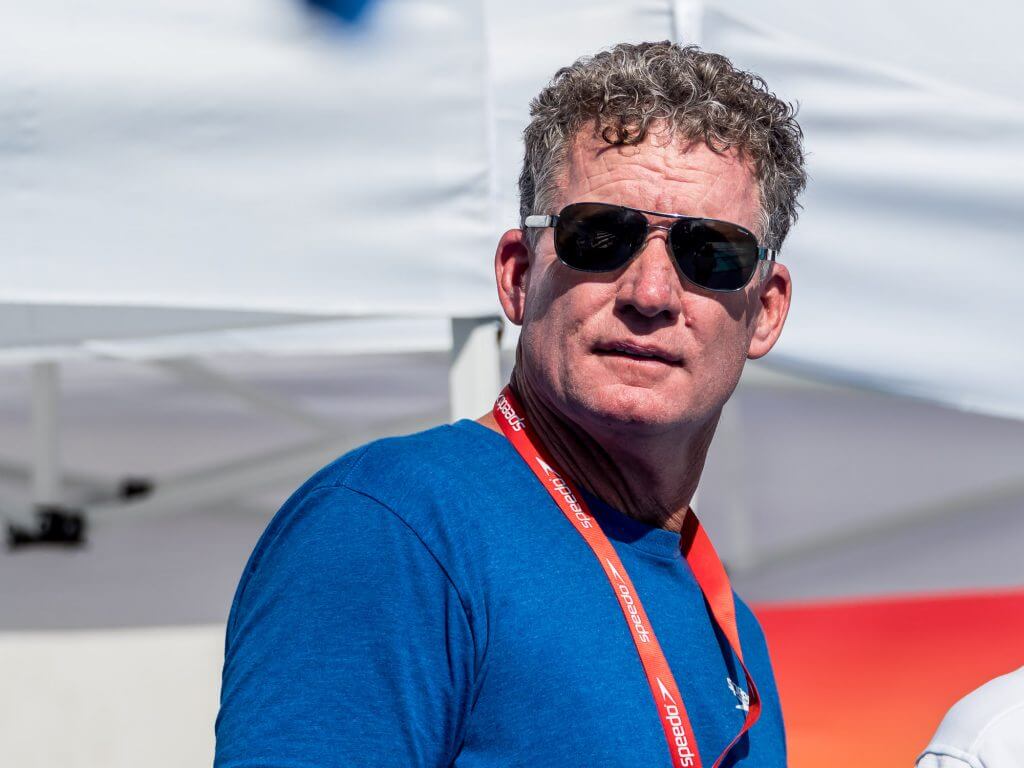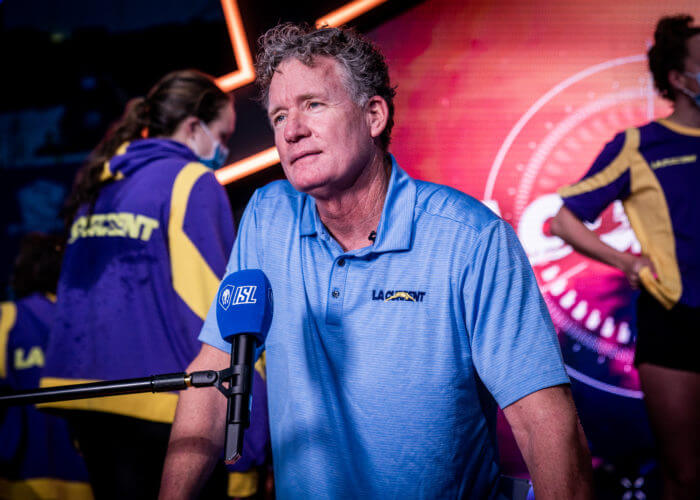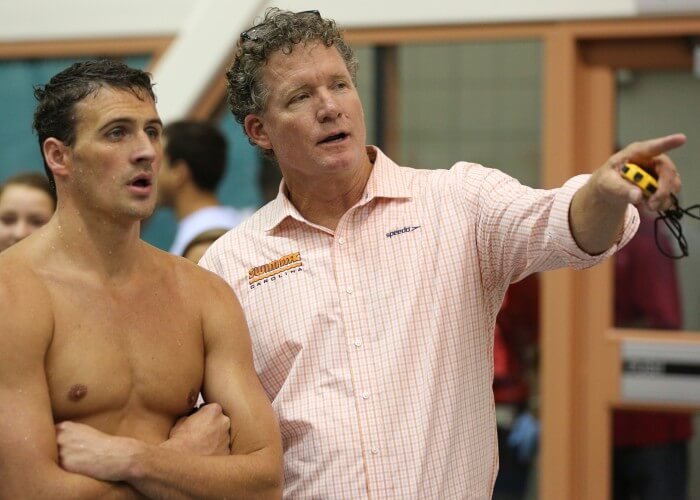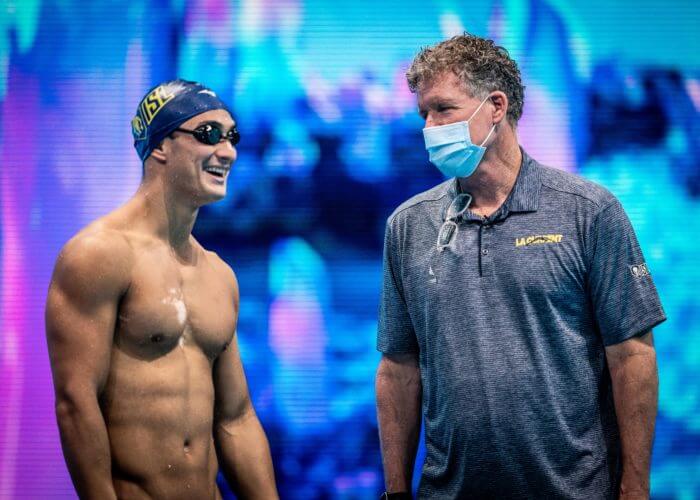Exclusive: Team Elite Head Coach David Marsh Discusses Preparations for 2021 Olympic Trials

Team Elite Head Coach David Marsh Discusses Preparations for 2021 Olympic Trials
One of the finest coaches in the world, David Marsh is just a few months away from induction into the International Swimming Hall of Fame. He’s also looking to guide his latest group of athletes to success at next month’s United States Olympic Trials in Omaha. Now the head coach of Team Elite Aquatics, a professional training group for Olympic prospects, Marsh first rose to coaching prominence when he guided Auburn to seven NCAA men’s championships (1997, 1999, 2003, 2004, 2005, 2006, and 2007) and five national championships (2002, 2003, 2004, 2006, 2007) on the women’s side. Following the 2007 victories, Marsh moved on from his position at Auburn and became Head Elite Coach and CEO of the United States Olympic Committee Center of Excellence with SwimMAC Carolina. The coach of the women’s squad at the 2016 Olympic Games, Marsh recently took time to discuss his team’s preparation for a major summer.
SWIMMING WORLD: To start off with a pretty broad question, could you detail the plan for Team Elite’s training cycle leading up to Omaha? How has volume and intensity developed from the ISL season to now, how it will shift as we near Trials, and how do you individualize that progression for each athlete?

Photo Courtesy: Mine Kasapoglu/ISL
DAVID MARSH: Well, during the ISL season we made a real effort to taper through the meets. About halfway through ISL, most of the athletes I was coaching were swimming at their best. They didn’t have the big drops at the end like you see with typical front-end training followed by a big taper because they were racing, swimming aerobically, racing some more, then swimming aerobically again.
After ISL, we were focusing more on foundational training. We had a little more pool time at that point so we were able to follow what most would consider a traditional training program. We only did two doubles a week to keep our volume relatively low with 40,000-50,000 yards per week and 30,000-40,000 yards for sprinters, so we’re certainly more of a quality-oriented program.
Our taper for Olympic Trials will be a pretty traditional taper for me. What I do is basically begin to make some adjustments to the intensity about six weeks out. We’re still lifting weights and doing the same volume since I keep yardage relatively low in normal training, but we drop the intensity more and try to make sure that we’re really nailing the details on the days that we train hard. Even today, which was a mid-level training session, Anastasia Gorbenko did 3×200 breaststroke descending down to 2:36 which was even-split and a very nice swim. Kathleen Baker also swam a 2:13 200 backstroke that day with a racing suit on, which was also even-split and looked good. What I want to see from my swimmers at this point is for them to have command over their swimming, which is why we do tests like that.
So, our training will naturally drop down but my tapering sequence follows SPA, which means we cycle between a speed day, a pace day, and an aerobic day, which I think a lot of other coaches practice as well, although some may believe more in SPAAA. Anyway, we’ll begin cycling through SPA anywhere between two to six weeks out depending on the athlete. So, some of my swimmers getting ready for Trials have already started that, and then we just load it differently. The loading will change based on how they’re performing, how they’re feeling, looking, you name it. I was just recently telling my group of pros that I need really honest and correct feedback right now. If you come to practice and you’re not feeling right, or you’re warming up and you don’t feel like you can make something special happen that day, then I need to know because I may adjust the plan for you specifically that day. And you know, sometimes I won’t adjust because I want them to have to perform while they’re not feeling all that great, but other times I will make that adjustment if I feel like they need it.

Photo Courtesy: Kevin Liles-USA TODAY Sports
At the end of the day, I feel like at this time of year it’s all about circling around confidence and the preparation they’ve done, the technical improvements they’ve made, and their belief in themselves to step up on that block and be supremely confident that they can execute their best races at the right time.
SW: So as their coach, what do you do to build and nourish that confidence in your athletes on days they feel off?
DM: I try to listen and understand why that’s the case, why they’re feeling off. For example, the other day some of my guys got a deep massage from our specialist that comes down from L.A., so I back off on their load because I understand you need a couple of days to recover from that. At the same time, we’ve got to get a certain amount of work done on certain days. It comes down to a lot of communication between us about how they’re feeling and what we’re observing. I would rather have somebody a little bit more rested and prepared than overtrained, tired, or burned out emotionally. Another piece of it is just reminding them of the great things that they’ve done in training and the year that it’s been! In San Diego here, just a year ago, we were able to get in the backyard pool during the pandemic, we were able to shift to Coronado Island as our main training center come June to get the LCM work that we needed, and that allowed us to not feel like we were behind anybody.
SW: Has COVID or international travel presented any challenges to Team Elite’s training since the Coronado facility opened to you last June?
DM: Definitely, I mean we lost our primary pool. Prior to the pandemic, we were training at the Jewish Community Center in La Jolla and the new pandemic restrictions really inhibited the amount of training that we could get done. So even though we eventually were able to shift to Coronado, the problem was that all of our guys lived around the JCC pool and we lift weights in Del Mar, so they’re having to drive an extra 35-40 minutes to get to practice in Coronado which just takes additional time, energy, and planning.
SW: Tell me about the team dynamic with your pro swimmers. With so much individual talent on Team Elite representing so many different countries, in what ways do you see leadership on deck?
DM: Great question. I would say our leader transitions based on the time and purpose. Throughout the year Jacob Pebley is the hard-working, get in the water on time, get intervals done, action guy. Kathleen Baker is the emotional leader, coming in every day very excited about practice and wanting to know everything we’re going to do, what details we’re going to focus on, should I take a caffeine pill, anything she needs to do to be amazing at that practice. She’s highly motivational. Lately, though, Anthony Ervin has been back in town to train for Trials and has brought a great deal of leadership with his knowledge. He’s honestly a coach in the water. Just yesterday he was working with Andi Murez on her start and he had some very valuable observations for her that I absolutely would not have picked up on. So I’d say we have a lot of great separate leadership pieces that function really well together and lead at different times in different ways.
SW: Lastly, are there any other notable times from practice swims that you want to share?

Photo Courtesy: Mine Kasapoglu/ISL
DM: Recently, this wasn’t a practice swim, but the most notable was from a small meet we hosted where Linnea Mack swam a 54.0 and 24.9 in the 100 and 50 meter free. So she’s been making huge strides. We’ve worked a lot on her race strategy, actually slowing down the first 50 so she can really utilize her phenomenal underwater kicking for the full 15 meters off that second wall to put her in the right position to come home real strong. Also, Kristian Gkolomeev has been going under 22 seconds all the time in the 50 free in practice. He generally goes 21.7-21.9 on the hand watch, which might be a 22 low, but he can honestly go that anytime under any condition during practice.
One last thing I’d like to add is that we’re hosting a sendoff fundraiser for our athletes on June 3 at The Plunge by Mission Beach. We’ll be first hosting a clinic, followed by some racing with our pros, and then they’ll spend some time telling their Olympic stories and answering any questions. We’d really love to see swimmers from the San Diego area show up to support.
David Marsh Coaching Honors:
2016 USA Women’s Olympic Team Head Coach
2016 Inducted into the North Carolina Swimming Hall of Fame.
2014 USA Women’s Team Assistant Pan Pac Championships, Australia
2012 USA Men’s Olympic Team Assistant
2010 USA Men’s Duel in the Pool Head Coach
2005 USA World Championships Assistant Men’s Assistant Coach
2003 USA World Championships Head Coach
2005, 2003 USA Men’s Mutual of Omaha Duel in the Pool Head Coach
2003 & 2000 National Collegiate and Scholastic Swimming Trophy
2003 Board Member of the Greater Lee County Boys and Girls Club
2000 USA Men’s Olympic Team Assistant Coach
1999 USA Men’s Pan-Pacific Team Assistant Coach
NCAA Women’s Coach of the Year: `01, `02, `03
NCAA Men’s Coach of the Year: `94, `97 `99, `03, `04
SEC Men’s Coach of the Year: `92, `93, `97, `98, `99, `01, `03, `04, `05
SEC Women’s Coach of the Year: `93, `02, `03
Knoxville News-Sentinel Men’s Coach of the Year: `93, `95, `98, `99, `01, `03, `04
Knoxville News-Sentinel Women’s Coach of the Year: `92, `93, `03
Inside the Auburn Tigers Coach of the Year: `93, `96, `97, `03, `04
1996 USA Men’s Olympic Team Assistant Coach
1995 USA Men’s Pan-Pacific Team Head Coach
1994 USA Women’s Assistant Coach-World Championship Team
Honored on the “Tiger Trail” of Auburn which commemorates athletic achievements by coaches and athletes. 2015 Auburn Swimming Hall of Fame.
Marsh also serves on the boards of the American Swimming Coaches Association as well as the Championship Performance Advisory Board.




No better coach and mentor then Marsh!